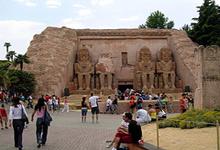Recently Viewed Cruises
- Classy Astor fills gap in market
- Oceanic Discoverer
- Ab Fab Oosterdam
- Catch up on Cruising: Latest cruise news in bite size
- Catch up on Cruising: Latest cruise news in bite size
- Frequently Asked Questions
West Bank, Egypt

West Bank at Luxor is located in Upper (southern Egypt). The West Bank is opposite the city of Luxor, across the Nile River where we find the Necropolis of Thebes, and that most famous of Pharaohs, Tutankhamen. This is where the Valley of the Kings, and also the lesser known Valley of the Queens make up part of a huge "City of the Dead" where the Pharaohs, their Queens and nobles of the 2nd millennium B.C. were buried with full religious and ceremonial trappings.
Things to see and do
* Valley of the Kings
* Valley of the Queens
* Tombos of the Nobles
* Medinet Habu (memorial temple of Ramesses III)
* The Ramesseum (memorial temple of Ramesses II)
Cruise Season - Oct - April
Currency - Egyptian pound (LE) (EGP)
Language - Arabic
Land Area - 416 km² (Luxor)
Population - 390,000 approx (Luxor)
Electricity - 2 pin round pins European style
Time - GMT plus two hours
International Country Telephone Code - +20
Port Location - The port is located on the Nile River in downtown Luxor.
Transport Links - Luxor is served by Luxor International Airport. It is a destination for flights on several European and Middle Eastern routes, as well as the main southern hub for domestic flights within Egypt.
A bridge was opened in 1998, a few kilometres upstream of the main town of Luxor, allowing ready land access from the East Bank to the West Bank. Traditionally, however, river crossings have been the domain of several ferry services. The so-called 'local ferry' (also known as the 'National Ferry') continues to operate from a landing opposite the Temple of Luxor. Alternatively, motorboats line the East Bank of the Nile all day providing a quicker, but more expensive crossing to the other side.
The city of Luxor on the East Bank has several bus routes used mainly by locals. Tourists often rely on horse carriages, called "calèches," for transport or tours around the city.
For domestic travel along the route of the Nile, a rail service operates several times a day. A morning train and sleeping train can be taken from the station situated around 400 metres (440 yd) from Luxor Temple. The line runs between several major destinations, including Cairo to the north and Aswan to the south.



